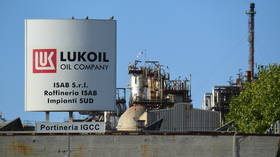Italy greenlights sale of Russian refinery – Reuters

The Italian government has approved the sale of the ISAB refinery in Sicily, which is owned by Russia’s largest private oil company, Lukoil, to Cyprus’ GOI Energy, a branch of private equity group Argus, Reuters reported on Wednesday, citing sources.
In January, Lukoil reported that it had reached a preliminary agreement with the company for the sale of the plant. However, the transaction had to be approved by the Italian authorities as it fell under the ‘Golden Power’ regulations, due to being part of an industry considered to be of strategic importance. The plant is one of the largest industrial sites in Western Europe and refines roughly 320,000 barrels of oil per day, one-fifth of Italy’s refining capacity.
The government reportedly placed strict conditions on the deal, demanding that the new owner protect the plant’s staff of around 1,000, as well as maintaining environmental standards. GOI Energy was also urged to guarantee that oil supplies for the refinery do not come from Russia, sources told the news outlet.
According to the Financial Times, the sale is worth €1.5 billion ($1.6 billion), and involves commodity trader Trafigura, which is to provide both working capital and oil supplies to the refinery, as well as marketing the refined products.
ISAB has been under temporary state trusteeship since December last year, to protect it ahead of the EU embargo on Russian crude oil imports.
Prior to the ban, the plant relied solely on Russian Urals oil for its supplies and risked stopping production and being closed once the ban came into force on December 5. Reports at the time suggested that Rome even considered nationalizing the plant to keep it operational in order to save jobs and secure energy supplies.
For more stories on economy & finance visit RT's business section












